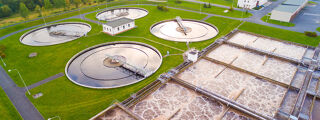Optimising the output of renewable energy sources is one of the key ways to help combat reliance on environmentally damaging fossil fuels. Biological waste material, like the kind that is naturally produced in water treatment is a well known source of biofuel, but the yield from biofuel conversion is generally low. Doosan Enpure's patented Sonix technology aims to increase the yield of biogas production but the technology required rigorous testing before they could move forward. Dr Lynsey Melville worked with Doosan to test and optimise the technology.
Researchers
Research background
The agricultural sector is responsible for more than 40% of environmental methane emissions and more than 50% of nitrous oxide emissions. Given the current climate emergency, these numbers require a dramatic reduction. One such way to reduce these emissions is to make positive use of biological waste products through biogas conversion, but the efficacy of this process is entirely dependent on the economic benefits of biogas yield versus the time and cost of production. To accomplish this, Doosan developed new technology which treats waste material with ultrasound waves before undergoing biogas conversion, resulting in increased yields and better efficiency.In order to optimise the technology, improve performance and explore a variety of applications Doosan engaged the support of BCU to better understand the impacts of various operational parameters on biogas production and organic solids destruction.
Research aims
The aim of the project was to test and optimise the industry partner's Sonix technology, which is a way of pre-treating biological material to improve biogas production.
Research methods
Dr Lynsey Melville worked with Doosan’s technical team to test and optimise the Sonix technology. Using scientifically robust methods and materials, which were not available to the industry partner at the time, the technology was tested in several lab scale and pilot scale trials and optimised by evaluating various operational parameters such as retention time and pressure and their subsequent impacts on biogas production. In addition, the research and subsequent publication of findings by an independent academic party enabled Doosan to improve performance and explore alternative applications
Results
Dr Lynsey Melville’s work in testing and measuring their new pre-treatment technology gave Doosan and their internal investors, Korea-based Doosan Corporation, the confidence they needed to invest further in the technology's development. The work has increased the efficacy of their technology and provided research which has seen substantial £1M investment, giving Doosan Enpure potential routes to market.
